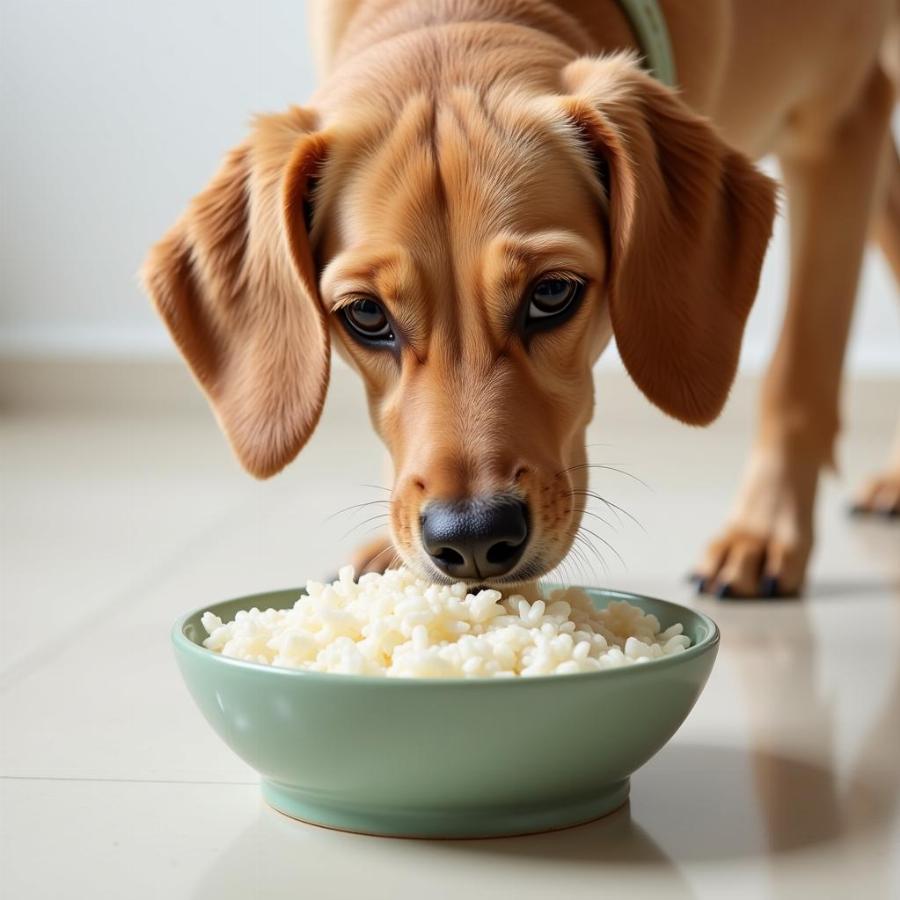White rice is a common household staple, and many dog owners wonder if it’s safe and beneficial for their furry friends. The short answer is yes, plain, cooked white rice can be a good option for dogs, especially those experiencing digestive upset. However, it’s essential to understand when and how to feed white rice to your dog and what potential concerns to be aware of. This article will explore the benefits and drawbacks of white rice for dogs, providing a comprehensive guide to help you make informed decisions about your pet’s diet.
Is White Rice Good for Dogs?
White rice is easily digestible and gentle on a dog’s stomach, making it a suitable food during bouts of diarrhea or vomiting. It’s a good source of carbohydrates, providing energy, and can help solidify stool. However, white rice lacks essential nutrients compared to brown rice and shouldn’t be a primary food source. It should be considered a supplemental food for short-term dietary needs or as part of a balanced diet prescribed by your veterinarian.
It’s crucial to feed your dog plain white rice. Avoid adding seasonings, butter, or oils, as these can be harmful to your dog’s digestive system and overall health.
How to Prepare White Rice for Your Dog
Cooking white rice for your dog is straightforward. Use more water than you typically would when cooking for yourself, resulting in a softer, mushier consistency that’s easier for your dog to digest. Avoid adding any seasonings or other ingredients. Once cooked, let it cool completely before offering it to your dog.
You can mix the rice with a small amount of boiled chicken or plain yogurt for added flavor and nutrients, always ensuring that these additions are safe for your canine companion. Remember to consult with your vet before making any significant dietary changes.
Can Dogs Eat White Rice Every Day?
While white rice is safe for dogs in moderation, it shouldn’t be a daily staple in their diet. A diet solely based on white rice lacks the necessary nutrients for a dog’s optimal health and growth. Feeding white rice every day can lead to nutritional deficiencies and health problems in the long run. bland diet for dogs recipe can offer more insight into balanced meal options for sensitive stomachs.
Think of white rice as a temporary solution for digestive upset or a small addition to a balanced diet rather than a primary food source. A complete and balanced commercial dog food formulated for your dog’s age, breed, and activity level should always be the foundation of their diet.
When Should You Avoid Giving Your Dog White Rice?
There are certain situations when you should avoid giving your dog white rice. If your dog has diabetes, white rice can cause a spike in blood sugar levels. Always consult with your veterinarian before introducing white rice to a diabetic dog. For dogs with certain allergies or sensitivities, white rice might not be the best option. white foamy vomit in dogs could indicate a more serious issue and requires veterinary attention.
“For dogs with pre-existing health conditions, it’s crucial to consult with a vet before introducing any new foods, even something as seemingly benign as white rice,” says Dr. Emily Carter, DVM, a veterinary nutritionist.
 Dog Eating White Rice from a Bowl
Dog Eating White Rice from a Bowl
What are Alternatives to White Rice for Dogs?
If your dog can’t tolerate white rice or you’re looking for more nutritious alternatives, several other options exist. Brown rice offers more fiber and nutrients compared to white rice. Sweet potatoes and pumpkin are also excellent sources of fiber and vitamins. If you are looking for other options for small breeds, you might be interested in learning about teacup maltese dog. Another common question among dog owners is why do dogs wipe their bum on the floor? Understanding your dog’s behavior is essential for responsible pet ownership.
“Brown rice, sweet potatoes, and pumpkin are excellent alternatives to white rice, providing more nutrients and supporting digestive health,” adds Dr. Sarah Miller, a board-certified veterinary internist.
Conclusion
White rice can be a helpful addition to a dog’s diet in certain situations, particularly during digestive upset. However, moderation and careful preparation are key. Remember to consult with your veterinarian for personalized advice regarding your dog’s dietary needs. They can help you determine if white rice is appropriate and how to incorporate it safely and effectively into your dog’s diet.
FAQ
- Can puppies eat white rice? Yes, puppies can eat small amounts of plain cooked white rice.
- How much white rice can I give my dog? The amount depends on your dog’s size and the reason for feeding. Consult your vet for specific guidance.
- Can white rice cause constipation in dogs? In some cases, it can. Ensure fresh water is always available.
- Is instant rice okay for dogs? While not toxic, cooked regular white rice is preferable due to processing differences.
- Can I mix white rice with my dog’s regular food? Yes, but in moderation and only as recommended by your veterinarian. is pasta safe for dogs is another common query regarding dog-friendly human foods.
- What should I do if my dog vomits after eating white rice? Contact your veterinarian immediately.
- Are there any long-term effects of feeding my dog white rice regularly? Yes, nutritional deficiencies can develop if white rice replaces a balanced diet.
Further Reading
You might also be interested in learning about other safe foods for dogs and common dietary concerns.
Beaut Dogs is your one-stop resource for all things related to dog care, offering expert advice and valuable information on various breeds, health issues, and responsible pet ownership. When you need support, contact us via Email: [email protected] for detailed and accurate answers from Beaut Dogs. Visit us at https://beautdogs.com to discover the wonderful world of dogs and learn how to provide them with the best possible care.